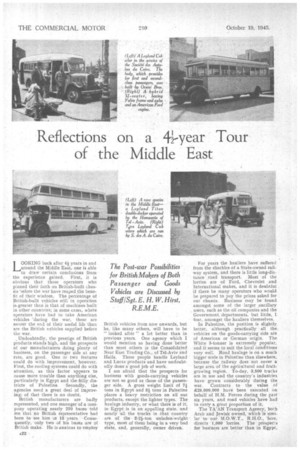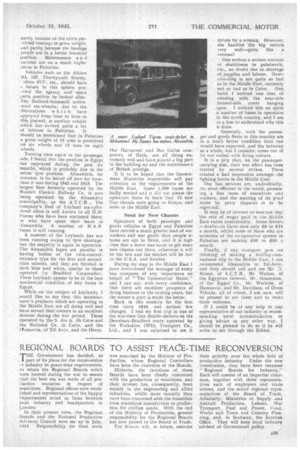Reflections on a 4-year Tour of the Middle East
Page 24

Page 25

If you've noticed an error in this article please click here to report it so we can fix it.
The Post-war Possibilities for British Makers of Both Passenger and Goods Vehicles are Discussed by Staff /Sgt. E. H. W. Hirst,
R.E.M.E.
LOOKING back after 4i years in and around the Middle East, one is able to draw certain conclusions from the experience gained. First, it is obvious that those operators who pinned their faith on British-built chassis ')efore the war have reaped the benefit of their wisdom. The percentage of British-built vehicles still in operation is.greater than.is that of machines built in other countries; in some cases, where operators have had to take American vehicles 'during the war, these are nearer the end of their useful life than are the British vehicles supplied before the war.
Undoubtedly, the prestige of British products stands high, and the prospects of our manufacturers doing plenty of business, on the passenger side at any rate, are good. One or two features could do with improvement, however. First, the cooling systems could do with attention, as this factor appears to cause more trouble than anything else, particularly in Egypt and the-hilly districts of Palestine Secondly, the agencies need a great deal of improv, ing: of that there is no doubt.
British manufacturers are badly represented, and one manager of a company operating nearly 250. buses told me that no British representative had been to • see him • M 15 years. '.-Consequently, only to of his buses are of British make. He is anxious to employ
A.22' British vehicles from now onwards, but he, like many others, will have to be
looked after" a lot better than in previous years. One agency which I would mention as having done better than most others isthe Consolidated Near East Trading Co., of Tel-Aviv and Haifa. These people handle Leyland and Lucas products and have .undoubtedly done a good job of work.
I am afraid that the prospects for business with goods-carrying vehicles are not so good as those of the passenger side. A grosi weight limit of 7i tons in Egypt and 81 tons in Palestine places a heavy restriction on all our products, except the lighter types. The ha ulage industry, or What there is of it; in Egypt is in an appalling state, and nearly all the trucks in that country are of the 2-4-ton unladen-weight type, most of them being in a very bad state, and, generally, owner driven.
For years the hauliers have suffered from the shackles of a State-owned railway system, and there is little long-distance road transport. Most of the lorries are of Ford, .Chevrolet and International makes, and it is doubtful if there be many operators who would be prepared to pay the prices asked for our chassis. Businessmay be found amongst some of the larger ancillary users, such as the oil companies and the Government, departments, but little, I fear, amongst the hauliers themselves.
In Palestine, the position is slightly better, although practically all the vehicles on the goods-carrying side are of American or German origin. The White 5-tonner is extremely popular, and it seems to suit the local conditions very well. Road haulage is on a much bigger scale in Palestine than elsewhere, because the .railway does not covee a large area of the agricultural and fruitgrowing region. To-day, 3,500 trucks are in use and the country's industries have grown considerably during them war. Contracts to the . value of A28,000,000 have been executed on behalf of H.M. Forces during the past six. years, and road vehicles have had to carry a great proportion of it.
The TA'AN Transport Agency, both Arab arid Jewish owned, which iS similar to our M.O.W.T., R,H.O., here, directs 1,000 lorries. The prospects for businesS are better than in Egypt,
partly because of the extra per-pitted tonnaga in gross weight, and partly because the haulage people are in a better financial position. Maintenance a n ii turnout are on a much higher plane in Palestine.
Vehicles such as the Albion EL 127, Thornycroft Sturdy, 'Mean 6VF, etc., should have .1 -future in this sphere prosided the agency and spare parts position be looked after. The I3cdford-Scarnmell articusated six-wheeler: due to the
illustrations whic 11have appeared from time to time in this journal, is another vehicle . which has evoked quite a lot of interest in Palestine. It should be mentioned that in Palestine a gross weight of 10 toils is permitted on six wile* and 12 tons on eight . wheels.
Turning once again to the passenger side, Ilound that the position in Egypt nas improved during the past six months, which is probably due to the better tyre position: Alexandria, for instance, is far better off now for buses than it was during 1942 and 1943. The largest fleet formerly operated by the Ramie!) Electric Railway Co. is now being operated by the Alexandria municipality, as the A.T.C.R. The company's fleet of Leyland six-cylin• dered oilers_is well known to all H.M. Forces who have been stationed there, or who have spent their leave in Alexandria. -A number of M A.N huses is still running.
A number of the Leylands has not been running owing to tyre shor-tage, but the majority is again in operation The Alexandria bmes are peculiar in having bodies of the twin-centralentrance type for the first and second. class saloons, and they are finished in dark blue and white, similar to those operated by • Bradford Corporatiog. These Leyland3 appear to be in the best mechanical condition of anybuses in Egypt.
While on the. subject of Leyland, I ,would like to say that this manufacturer's products which are operating in the Middle East are all doing well and • have served their owners in an excellent Manner during the war period. These operated by the S. des A. dii Caire and the National Co. in Cairo, and the 1.1konaa via, of Tel .Aviv, and the Hever, Har Harcarmel and Bat Galim companies, of Haifa, are all doing extremely well and have played a big part in the building up and the maintenance of British prestige.
It is to he hoped that the Government Ministries responsible will pay attention to the requirements of the Middle East. Some 1,500 buses are badly needed and it did not please the operators there to learn that 12 new Guy chassis were going to Kenya; and none to the Middle East.
Need for New Chassis
Operators of both passenger and gOods vehicles in Egypt and ,Palestine have carried a much greater load of war workers and war goods than people at home are apt to think„ and it is high time that a.move was Made to get some new chassis out there, otherwise it will be too late and the market wilt be lostto the U.S.A. and Sweden., During my stay in the Middle 'East I have interviewed the manager of every bus company of any importance on• 'behalf of " The Commercial Motor," and I can say, with every confidence, that there are excellent prospects of doing business in the corning yearS, but the sooner a start is made the better.
Back in this country for the first time since 1940, one notices few changes. had my first trip in one of the war-time Guy double-deckers on the Dewsbury-Bradford route operated by the Yorkshire (WD) Transport Co.. Ltd., and I was surprised to see it
driven by a woman. However, she handled the big vehicle, very well—quite like a veteran!
One notices a certain amount ot shabbiness in paintwork-, etc., no doubt due to shortage of supplies and labour. Overcrowding is not quite so had as in the Middle East, certainly, not so bad as in Cairo. One habit ,1 noticed was that of running with the near-side bonnet-side cover hanging open. I noticed this on quite a number of buses in operation in the north country, and I am at a loss to understand why this is done.
Generally, both the passenger and goods fleets in this country are in a much better condition than one would have expected. and the industry as a whole, has I consider, come out of it war ordeal with flying colours.
It_ is a pity that, on the passengercarrying side, their war effort has been marred by several Strikes. These created a bad impression amongst the fighting forces in the Middle East.
Our bus services are, undoubtedly. the most efficient in the world, possessing a fine team of executives .and_ workers; and the marring of its goo& name by petty disputes is to be
regretted. .
It may be of interest to mention that *the, rate of .wages paid in the Middle
• East varies considerably. Some drivers ---Arabs---in Cairo earn only £8 to LW a month, whilst some of those who are members of the co-operative system in Palestine are making £60 to £85 A month.
Finally, ' if any transport men ire thinkingof making a holiday-rumbusiness trip to the Middle East, I can recommend Alexandria or. Tel-Aviv, and they should call and see Mr..7t.
Kaniel, of Mr. Walker, of the Egyptian General, Mr.. Houseman, of the Egged Co., Mr. Werteim. of Harnaavia, and Mr. Davidson, of Drom Yehuda., all of whom, r am sure, will be pleased to see them and to make them welcome. ,
If I could be of any help to any representative of our industry in recommending hotel accOmmodation or giving advice in any other way, should be pleased to do so if be will write to me through the Editor. •




















































